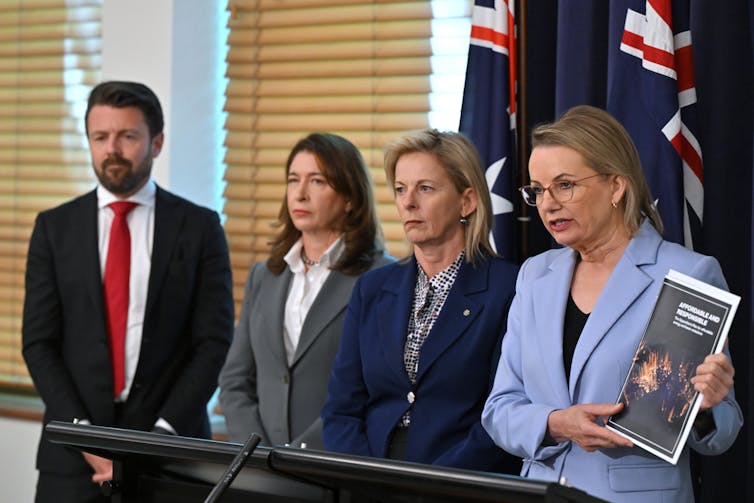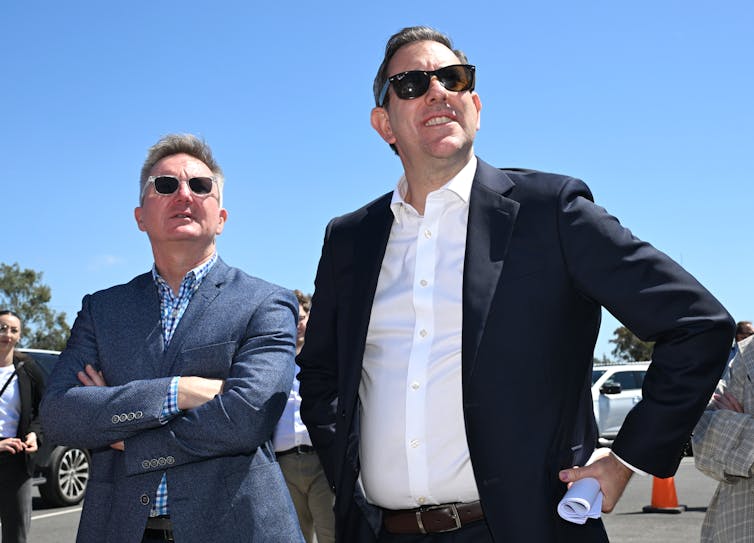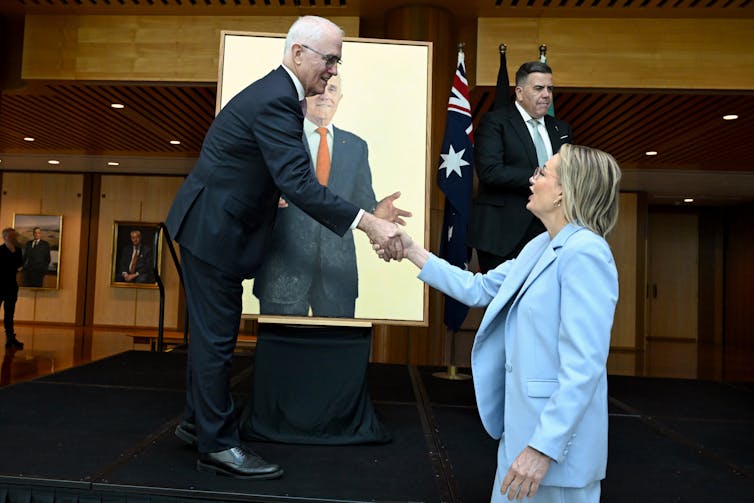When the music stopped, Greens had out-stepped flat-footed Liberals on environment deal
- Written by Michelle Grattan, Professorial Fellow, University of Canberra

Come dance with me! That was Environment Minister Murray Watt’s invitation to the opposition as he prepared to push through his reforms to the Environment Protection and Biodiversity Conservation Act.
Yes, get up and dance! That was business’s clear message to the Coalition. But it wouldn’t, or couldn’t agree with the government on mutually acceptable steps. The Greens could, and did. They won concessions on native forest logging and land clearing, and the exclusion of fossil fuel projects from the fast track approval process.
Finally, after more than five years, the EPBC job was done.
Watt always said he was open to dealing with either the Coalition or the Greens. The opposition is making all sorts of excuses, including that the legislation was rushed, but the bottom line is the Liberals failed an important test. It is the more galling because Ley, as environment minister, commissioned the independent review from Graeme Samuel that reported in 2020, on which this legislation is based.
The argument that the detailed legislation should have been held over until next year may appear superficially attractive but is flawed. The issue has dragged on for too long and more delay would only have invited slippage.
The government said the opposition was a shambles in its negotiations, including adding new demands as late as Wednesday. Among the Coalition negotiators Jonno Duniam, manager of opposition business in the Senate, seemed, according to Labor sources, the keenest to get a deal.
A week ago Duniam had certainly been confident there would be a Coalition-government agreement. Duniam was brought into the discussions in the last couple of weeks to support Angie Bell, the shadow environment minister. A Tasmanian from the conservative wing of the Liberals, Duniam is home affairs spokesman, but was previously shadow environment minister. In the Morrison government, he was assistant minister for forestry and fisheries, working under then-agriculture minister, Nationals leader David Littleproud. He was popular in the Littleproud office. “He did the shit Littleproud didn’t want to do,” says one observer from the time.

It’s not just business that would have preferred the deal to be with the Coalition. Western Australian Labor premier Roger Cook said on Thursday:
there has been a missed opportunity here and that missed opportunity was to do an agreement with the Liberal Party to make sure the legislation perhaps had further reflected the concerns about industry.
Samuel said after the decision that the Coalition had “dealt themselves into irrelevancy, following five years of obfuscation, obstruction and contradiction”. He said if business had problems with the legislation it should not complain to the government or the Greens, but to the opposition.
The reform is a major win for a government whose critics on the left are calling for it to be more reformist (although it doesn’t satisfy those who are hardline on fossil fuels). It should significantly speed up decisions for development projects as well as provide better environmental protection. It’s an impressive achievement personally for Watt, a pragmatic Queenslander from the left, who is one of the government’s best performing ministers.
Watt set out his determination to secure the legislation this final sitting week of 2025, consulted widely, negotiated endlessly, and was relatively transparent. He worked closely with the prime minister, who came into the negotiations in the closing stages to ensure a deal could be landed that was acceptable to stakeholders and deliverable quickly through the Senate.
While Watt could bask in his success, two colleagues, Treasurer Jim Chalmers and Climate and Energy Minister, Chris Bowen have ended the parliamentary year under substantial pressure.

As Chalmers prepares the budget update, released mid next month, this week’s uptick in inflation, to 3.8% over the year to October, not only underscores that home buyers won’t be getting any interest rate fall in the foreseeable future, but suggests the next rate move could possibly be up rather than down.
Chalmers is struggling to contain government spending for the next budget. That will hit the public service – which has just been told to find savings – but also likely other areas. Spending in general is running too high, and the early days of the term are when hard decisions need to be taken. Adding to Chalmers’ difficulties are calls for the mid-year update to extend relief on power bills, given the high energy costs. Chalmers says a decision has yet to be made.
In coming months Bowen will feel the political heat as much as Chalmers. The opposition targeted him in parliament, after the Australian government’s compromise deal with Turkey over next year’s United Nations climate conference (COP) which will see Bowen (as a consolation prize) in charge of negotiations.
The opposition is dubbing him the “part time” energy minister; Bowen insists the COP role can be readily fitted with his ministerial job. He was anxious to point out that most recent COP negotiators had had full ministerial positions as well. Within the government, there is a wait-and-see attitude on how the dual role will go for Bowen, who has his critics in Labor. Although the overload is seriously questionable – given the troubles in the energy transition and the political problem of power prices – the government can argue it is only for a year.
As the parliament wound down, a ceremony was held for the unveiling of former prime minister Malcolm Turnbull’s official portrait, with guests including former Liberal ministers Julie Bishop, George Brandis and Christopher Pyne. Unsurprisingly, Turnbull had some acerbic comments about the opposition’s performance on the environment bill, telling reporters, “the Coalition could have played an active role, but they chose not to. […] what few supporters they have left in the business community will just be horrified”. Ley dashed in for the obligatory handshake with the man in whose ministry she served, and then resigned from over a travel claim issue.

It was (of course) Barnaby Joyce who put on the show of the day, with his announcement to the parliament of his formal departure from the Nationals. Seeking relevance, the maverick is considered to be on his way to One Nation, although he is taking the slow train, and will for the moment be an independent.
Joyce, the smell of power in his nostrils, is likely to run as a One Nation candidate for the Senate. There, he said, they’d “have to come to me on each piece of legislation and say ‘what are your views?‘ I’ve done the Senate before – eight years, seven months and a day. I know that I know the job.”



















